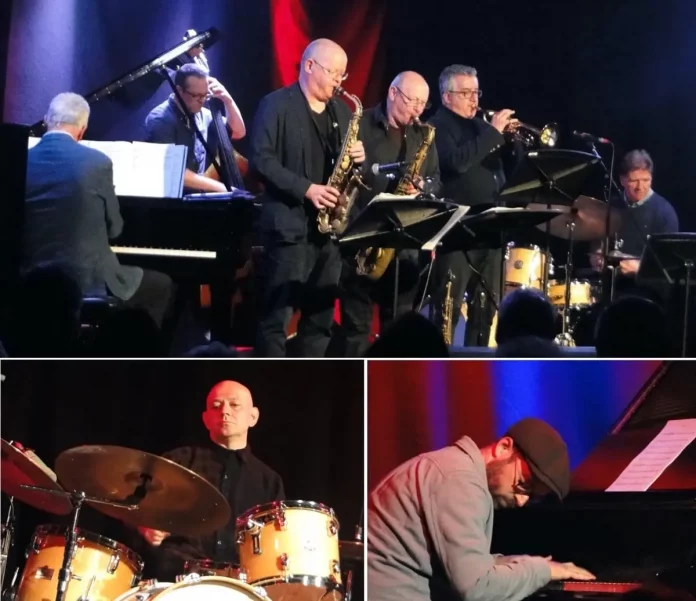
“Do you have a healthy relationship with the cycle of life?” asked drummer Sebastian Rochford of the audience during his performance with pianist Zoe Rahman. And he actually waited, intently, for an answer. The question was indicative of a performance of great seriousness in which the duo’s set almost entirely comprised Rochford compositions inspired by the death of his beloved father and collectively entitled A Short Diary.
The music was lyrical and the duo’s playing on the likes of Communal Decisions was variously delicate, spare, contemplative, stately and elegant. Love You Grampa eloquently communicated the love of his grandchildren for Rochford’s father and included elements of fun and playfulness. Any sentimentality felt authentic rather than manipulative.
Silver Light suggested something spiritual and transcendent while Even Now I Think Of Her, which was actually based on a melody created by Rochford’s father, was poignant and reflective.
This was a sublime gig and one hopes that the music provided consolation for Rochford in his grief, as it surely did for some in the audience.
London pianist Luke Bacchus’s publicity material draws attention to his music’s blend of jazz and Caribbean elements (his parents are from Guyana). Certainly he has a jazz musician’s improvisatory skills and harmonic sophistication but there’s a danger of being reductive when considering the Caribbean elements in his playing. Yes, the uplifting, vibrant melodies often evoked sun-kissed islands but Tilbury, for one – a tribute to the Windrush immigrants – was more ruminative than joyous while another original, though having a marvellously buoyant theme, had a turbulent piano solo that hinted at something darker and more troubled in the Caribbean experience.
Aside from his high-quality originals Bacchus performed two Bob Marley songs: a thoughtful, questing Concrete Jungle and a lovely, rhythmically witty Rastaman Chant.
Drummer Nate Ricketts and double bassist Amy Gadiaga supported with great sensitivity and Gadiaga sang Duke Ellington’s dreamy, romantic Caravan beguilingly. Marlon Hibbert, to my recollection the first jazz steel-pan player Belfast has ever seen, played with mesmerising brilliance. On Parakeet, for example, a new composition the band had never played before, he somehow, magically, evoked the image of a bird in flight.
“If you feel so inclined, please dance,” said Bacchus before the band’s final number, August Morning, a soca tune, and, amongst the toe-tappers, finger-snappers, shoulder-swayers and head-nodders, several ecstatic punters did indeed take him up on his invitation, as a wonderful performance ended in high spirits.
The Tom Ollendorff Trio (Conor Chaplin, bass and David Ingamells, drums) with pianist Aaron Parks played several compositions that were inspired by places. Atlantic Angels, for example, inspired by Sligo, was reflective, expansive and beautiful while Istanbul exquisitely conveyed wonderment and evoked the city’s glory, its bustle, its strangeness and its spirituality.
The band’s music was complex but melodically striking and the interactivity between the four musicians was very satisfying. Ollendorff’s cleanly articulated guitar solos were a delight, on Three Bridges (inspired by Edinburgh), Carnival (a tribute to Luis Bonfá) and elsewhere and Parks’ playing was astounding on Charlie Parker’s Bongo Beep, Sonny Rollins’ Airegin and, indeed, throughout.
Those of a nervous disposition may have felt somewhat freaked out by self-styled “doom-jazz” trio AKU! for, on numbers like Blind Fury and In The Bath Having A Magnum, the Glasgow-based band played boldly experimental music that was for the most part ferocious, abrasive, jarring and intense. Music ideally suited for the times we live in, in other words. The shrieks and cries of Harry Weir’s electronically distorted saxophone were at times shockingly powerful, Graham Costello’s drums were thunderous and Liam Shortall’s trombone was rhythmically insistent.
“I’m worn out!” exclaimed Weir before the band’s last song and little wonder for all three musicians had strained every sinew from first moment to last.
John Donegan – The Irish Sextet is an all-Ireland, all-star, mainly hard-bop band that in addition to composer-pianist Donegan includes a supple rhythm section in Dan Bodwell (double bass) and John Daly (drums) and a front line of Michael Buckley (alto and soprano sax), Richie Buckley (tenor and soprano sax) and Linley Hamilton (trumpet).
Donegan’s compositions were interesting and structurally unusual. Seb’s Story, written for a grandchild, conveyed a sense of irrepressible energy and movement. Along Came Freddie, composed for another grandchild, was touchingly tender. The ballad We Will Meet Again Sometime, played just by piano, bass and drums, spoke eloquently of separation and loss. Blues For KJ, a tribute to Keith Jarrett, was something of an earworm – and so on.
All the front-line musicians soloed on virtually every tune: Hamilton’s playing was characteristically lyrical, Richie Buckley played with fierce power, Michael Buckley with great fluency, his flow of ideas seemingly almost unstoppable, and Donegan himself was technically very assured and swinging.
Brilliant Corners, A Festival Of Jazz, 1-9 March 2024 Belfast















